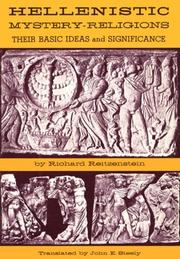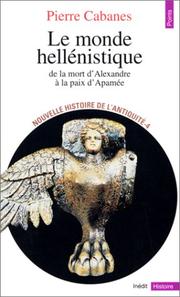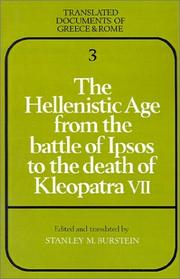| Listing 1 - 9 of 9 |
Sort by
|
Book
Year: 1972 Publisher: Paris : Presses universitaires de France,
Abstract | Keywords | Export | Availability | Bookmark
 Loading...
Loading...Choose an application
- Reference Manager
- EndNote
- RefWorks (Direct export to RefWorks)
Civilisation hellénistique --- Proche-Orient --- Grèce --- Jusqu'à 622 --- Jusqu'à 146 av. J.-C. --- 323-146 av. J.-C. (Epoque hellénistique)

ISBN: 0915138204 9780915138203 Year: 1978 Volume: 15 Publisher: Pittsburgh: Pickwick,
Abstract | Keywords | Export | Availability | Bookmark
 Loading...
Loading...Choose an application
- Reference Manager
- EndNote
- RefWorks (Direct export to RefWorks)
Mysteries, Religious. --- Religions. --- Mystères religieux --- Religions --- Greece --- Grèce --- Religion. --- Religion --- Mysteries, Religious --- Mystères religieux --- Grèce --- Greece - Religion --- Greece - Religion. --- Antiquité --- 323-146 av. J.-C. (Époque hellénistique) --- Antiquité --- 323-146 av. J.-C. (Époque hellénistique)

ISBN: 2020131307 9782020131308 Year: 1995 Volume: 215 Publisher: Paris: Seuil,
Abstract | Keywords | Export | Availability | Bookmark
 Loading...
Loading...Choose an application
- Reference Manager
- EndNote
- RefWorks (Direct export to RefWorks)
Hellenism. --- Hellenism --- Greece --- Civilization --- -Hellenism --- -Hellenism. --- Histoire ancienne --- Civilisation hellénistique --- Grèce --- 323-146 av. j.-c. (epoque hellénistique) --- Civilisation hellénistique --- Grèce --- 323-146 av. j.-c. (epoque hellénistique)
Book
ISBN: 0631233873 9780631233879 9780631233886 Year: 2008 Volume: *5 Publisher: Malden [etc.] Blackwell Publishing
Abstract | Keywords | Export | Availability | Bookmark
 Loading...
Loading...Choose an application
- Reference Manager
- EndNote
- RefWorks (Direct export to RefWorks)
Hellenism. --- Hellénisme --- Mediterranean Region --- Greece --- Méditerranée, Région de la --- Grèce --- History --- Histoire --- Hellénisme --- Méditerranée, Région de la --- Grèce --- Hellenism --- Macedonia --- Méditerranée (région) --- 323-281 av. J.C. (Domination macédonienne) --- 323-146 av. J.-C. (Époque hellénistique)
Book
ISBN: 9782859446536 2859446532 9791035101718 Year: 2010 Volume: 105 Publisher: Paris: Publications de la Sorbonne,
Abstract | Keywords | Export | Availability | Bookmark
 Loading...
Loading...Choose an application
- Reference Manager
- EndNote
- RefWorks (Direct export to RefWorks)
La démocratie athénienne ne fut pas seulement affaire d’institutions politiques. Sa pérennité, depuis la fin de la période archaïque jusqu’au ier siècle avant notre ère, tient en grande partie à l’existence d’une vie communautaire particulièrement dense qui, entre la sphère de la famille et celle de la cité, participait à la construction du lien social. Qu’il s’agisse de subdivisions civiques (dèmes, phratries), de communautés sacerdotales (genê) ou d’associations cultuelles (thiases, orgéons, synodes, eranoi), c’est au sein de ces différents groupes que chaque citoyen prenait part à la vie démocratique. Structurées autour de pratiques cultuelles spécifiques, possédant des terres et des biens, désignant en leur sein des magistrats ou votant des lois et des décrets, toutes ces associations ne constituaient pas pour autant des entités fermées sur elles-mêmes. Leur étude croisée fournit à ce titre un point d’observation à partir duquel le fonctionnement de la société civique athénienne peut être appréhendé dans son ensemble. À cette aune, la cité apparaît comme un faisceau d’entités composites, un ensemble de réseaux de multiples dimensions, loin de l’image stéréotypée de la cité une et indivisible promue par l’idéologie civique. Peut-être est-ce précisément là que réside la grande originalité de l’Athènes classique : ces communautés au fonctionnement emboîté forment la trame d’un espace public pluridimensionnel. Largement inspirée de la démarche de la micro-histoire, cette étude propose ultimement une hypothèse sur la nature même du politique athénien.
Athens (Greece) --- Greece --- Athènes (Grèce) --- Grèce --- History. --- History --- Histoire --- Athènes (Grèce) --- Grèce --- Classics --- réseaux d’échanges --- démocratie --- société civique --- microhistoire --- époque classique athénienne --- Antiquité classique --- associations athéniennes --- citoyenneté --- Associations --- Citoyenneté --- Inscriptions grecques --- 499-323 av. J.-C. (Époque classique) --- 323-146 av. J.-C. (Époque hellénistique)
Book
ISBN: 9783515092654 351509265X Year: 2010 Volume: 206 Publisher: Stuttgart: Steiner,
Abstract | Keywords | Export | Availability | Bookmark
 Loading...
Loading...Choose an application
- Reference Manager
- EndNote
- RefWorks (Direct export to RefWorks)
Democracy --- City-states --- Hellenism --- Démocratie --- Cités-Etats --- Hellénisme --- History --- Histoire --- Greece --- Grèce --- Politics and government --- Politique et gouvernement --- 321.8 --- Social sciences States Democracies --- Demokratie. --- Hellenismus. --- Polis. --- Geschichte 336 v. Chr.-148 v. Chr. --- Démocratie --- Cités-Etats --- Hellénisme --- Grèce --- Self-government --- Political science --- Equality --- Representative government and representation --- Republics --- Democracy - Greece --- Greece - Politics and government - To 146 B.C --- 323-146 av. J.C. (Époque hellénistique) --- Asie mineure --- Jusqu'à 146 av. J.C. --- Antiquité --- 323-146 av. J.C. (Époque hellénistique) --- Jusqu'à 146 av. J.C. --- Antiquité
Book
ISBN: 9782356130372 2356130373 2356134808 Year: 2011 Volume: 30 Publisher: Pessac Paris Ausonius Diffusion de Boccard
Abstract | Keywords | Export | Availability | Bookmark
 Loading...
Loading...Choose an application
- Reference Manager
- EndNote
- RefWorks (Direct export to RefWorks)
Qu’est-ce que la religion civique ? Quelle est la spécificité des cultes civiques ? S’il semble possible de le savoir dans l’Athènes classique, la réponse à cette question paraît hors d’atteinte dans les autres cités par défaut de documents. À l’époque hellénistique en revanche, les lois sacrées se multiplient dans l’ensemble du monde égéén et nous montrent que, contrairement à une idée reçue, les cultes civiques ne connaissent pas de désaffection. C’est même à l’époque hellénistique tardive (moment où les cités risquent de s’effacer dans l’Empire romain) que ces textes épigraphiques éclairent le mieux la question. Ils permettent de décrire la réalité matérielle des cultes civiques (rituels, implication de la cité dans leur organisation, intervention des évergètes, financement) et de comprendre les enjeux idéologiques des « restaurations ». En effet, à cette époque, non seulement l’Athènes redevenue prospère par la grâce de l’alliance romaine, mais de nombreuses cités égéennes tentent de réaffirmer leur identité et d’assurer leur cohésion en restaurant ou en « amplifiant » les « cultes traditionnels ». Même lorsqu’elles n'ont pas les moyens de cette ambition, elles privatisent le financement tout en gardant un contrôle étroit sur des cultes qu’elles considèrent comme leurs biens propres. Il apparaît donc qu'il n’y a pas plus, à l’époque hellénistique tardive, de déclin des cultes civiques que de déclin de la cité, mais au contraire, un été indien de la religion civique dans l’ensemble du monde égéen.
Cultes --- Rites et cérémonies politiques --- Inscriptions grecques. --- Religion et politique --- Administration locale --- Religion --- Histoire. --- Sources. --- Grèce --- Vie religieuse. --- Greece --- Grèce --- Histoire --- Sources --- Culte public --- Religion grecque --- Religion grecque et politique --- Égée, Îles de la mer --- Inscriptions grecques --- 1er siècle av. J.-C. --- Antiquité --- 323-146 av. J.-C. (Époque hellénistique) --- History --- Antiquité grecque --- religion antique --- religion civique --- Antiquity --- civic religion --- Athens --- Rites et cérémonies politiques --- 1er siècle av. J.-C. --- Égée, Îles de la mer --- Antiquité --- 323-146 av. J.-C. (Époque hellénistique)

ISBN: 2130352634 2130352642 9782130352631 9782130352648 Year: 1978 Volume: 6, 6 bis Publisher: Paris: Presses Universitaires de France,
Abstract | Keywords | Export | Availability | Bookmark
 Loading...
Loading...Choose an application
- Reference Manager
- EndNote
- RefWorks (Direct export to RefWorks)
Hellenism --- Hellénisme --- Greece --- Grèce --- History --- Histoire --- Civilization --- 938.08 --- 938 --- Geschiedenis van Griekenland: 323-146 v.Chr.: hellenistische periode --- Geschiedenis van Griekenland tot 323 --- History Ancient world Greece Hellenistic period (323-146 b.C.) --- -Hellenism. --- -938.08 --- 938 Geschiedenis van Griekenland tot 323 --- 938.08 Geschiedenis van Griekenland: 323-146 v.Chr.: hellenistische periode --- Hellenism. --- -Hellenism --- Hellénisme --- Grèce --- Griechenland --- Hellas --- Yaṿan --- Vasileion tēs Hellados --- Hellēnikē Dēmokratia --- République hellénique --- Royaume de Grèce --- Kingdom of Greece --- Hellenic Republic --- Ancient Greece --- Ελλάδα --- Ellada --- Ελλάς --- Ellas --- Ελληνική Δημοκρατία --- Ellēnikē Dēmokratia --- Elliniki Dimokratia --- Grecia --- Grčija --- Hellada --- اليونان --- يونان --- al-Yūnān --- Yūnān --- 希腊 --- Xila --- Греция --- Gret︠s︡ii︠a︡ --- 938 History of ancient Greece (to 323 AD) --- History of ancient Greece (to 323 AD) --- Histoire grecque --- --323-146 av JC, --- Greece - Civilization - To 146 B.C. --- -Greece --- -Hellénisme --- Civilisation hellénistique --- Royaumes hellénistiques --- 323-146 av. j.-c. (epoque hellénistique) --- Civilisation hellénistique --- Royaumes hellénistiques --- 323-146 av. j.-c. (epoque hellénistique)

ISBN: 052128158X 0521236916 0511552610 9780521281584 Year: 1985 Volume: 3 Publisher: Cambridge: Cambridge university press,
Abstract | Keywords | Export | Availability | Bookmark
 Loading...
Loading...Choose an application
- Reference Manager
- EndNote
- RefWorks (Direct export to RefWorks)
Greek and Roman history has largely been reconstructed from the works of Herodotus, Thucydides, Livy, Tacitus, and other major authors who are today well represented in English translations. But much equally valuable documentary material is buried in inscriptions and papyri and in the works of Greek and Roman grammarians and scholars, and less well known historians and literary figures, of whose writings only isolated quotations have been preserved. Translated Documents of Greece and Rome has been planned to provide, above all, primary source material for the study of the classical world. It makes important historical documents available in English to scholars and students of classical history. The format of the translations is remarkable in attempting to reproduce faithfully the textual difficulties and uncertainties inherent in the documents, so that the reader without a knowledge of classical languages can assess the reliability of the various readings and interpretations. The author's purpose in compiling this book is to help the teaching of Hellenistic history at undergraduate and graduate level by providing students and teachers with a representative selection of accurately translated documents dealing with the political and social history of Greece and the Near and Middle East from c. 300 to c. 30 BC. The continuing vitality of the Greek cities in the Hellenistic period and the interaction of Greek and non-Greek cultures in the Near and Middle East after Alexander are the two themes to which the author pays particular attention. In accordance with the principles of this series, selections from readily available major authors such as Polybius and Plutarch have been excluded except where unavoidable. Instead the bulk of the selections have been drawn from papyrological and epigraphical sources, many of which have never been translated into English before. The texts include city decrees and regulations, royal letters and ordinances, records of embassies and judicial decisions, dedications, treaties, statue bases, and documents dealing with the establishment of festivals, dynastic and other religious cults, education and other endowments. Brief commentaries and bibliographical notes accompany each text. Students and teachers of ancient history and classical civilization will welcome this book. Those studying Jewish history and the historical background of early Christianity will also find it interesting.
Histoire grecque --- --Hellenism --- Hellenism --- Egypt --- Greece --- Macedonia --- Middle East --- Macedon --- Makedhonia --- Makedonia --- Makedoniya --- Makedonja --- Griechenland --- Grèce --- Hellas --- Yaṿan --- Vasileion tēs Hellados --- Hellēnikē Dēmokratia --- République hellénique --- Royaume de Grèce --- Kingdom of Greece --- Hellenic Republic --- Ancient Greece --- Ελλάδα --- Ellada --- Ελλάς --- Ellas --- Ελληνική Δημοκρατία --- Ellēnikē Dēmokratia --- Elliniki Dimokratia --- Grecia --- Grčija --- Hellada --- اليونان --- يونان --- al-Yūnān --- Yūnān --- 希腊 --- Xila --- Греция --- Gret︠s︡ii︠a︡ --- Égypte --- Ägypten --- Egitto --- Egipet --- Egiptos --- Miṣr --- Southern Region (United Arab Republic) --- Egyptian Region (United Arab Republic) --- Iqlīm al-Janūbī (United Arab Republic) --- Egyptian Territory (United Arab Republic) --- Egipat --- Arab Republic of Egypt --- A.R.E. --- ARE (Arab Republic of Egypt) --- Jumhūrīyat Miṣr al-ʻArabīyah --- Mitsrayim --- Egipt --- Ijiptʻŭ --- Misri --- Ancient Egypt --- Gouvernement royal égyptien --- جمهورية مصر العربية --- مِصر --- مَصر --- Maṣr --- Khēmi --- エジプト --- Ejiputo --- Egypti --- Egypten --- מצרים --- United Arab Republic --- History --- Inscriptions --- Hellénisme --- Sources --- Egypte --- Macédoine --- Moyen-Orient --- Sources. --- Histoire --- Arts and Humanities --- Hellenism - Sources --- Greece - History - Macedonian Hegemony, 323-281 BC - Sources --- Greece - History - 281-146 BC - Sources --- Macedonia - History - Diadochi, 323-276 BC - Sources --- Middle East - History - To 622 - Sources --- Grèce --- Royaumes hellénistiques --- Égypte --- 323-146 av. J.C. (Époque hellénistique) --- 332-30 av.J.-C.
| Listing 1 - 9 of 9 |
Sort by
|

 Search
Search Feedback
Feedback About UniCat
About UniCat  Help
Help News
News